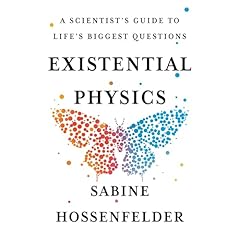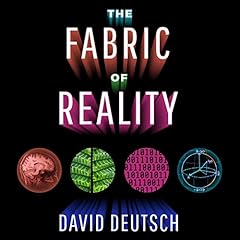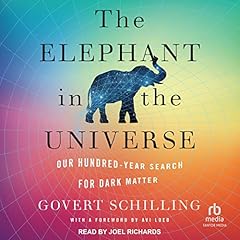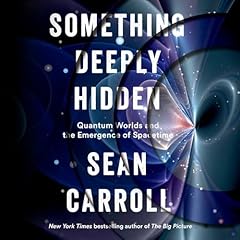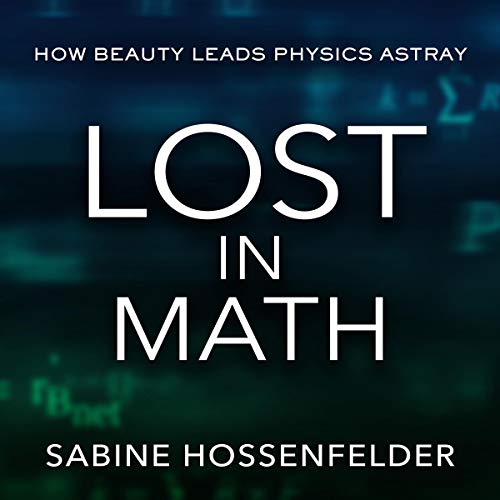
Lost in Math
How Beauty Leads Physics Astray
Failed to add items
Add to basket failed.
Add to wishlist failed.
Remove from wishlist failed.
Adding to library failed
Follow podcast failed
Unfollow podcast failed
Buy Now for £18.99
No valid payment method on file.
We are sorry. We are not allowed to sell this product with the selected payment method
-
Narrated by:
-
Laura Jennings
About this listen
A contrarian argues that modern physicists' obsession with beauty has given us wonderful math but bad science
Whether pondering black holes or predicting discoveries at CERN, physicists believe the best theories are beautiful, natural, and elegant, and this standard separates popular theories from disposable ones. This is why, Sabine Hossenfelder argues, we have not seen a major breakthrough in the foundations of physics for more than four decades. The belief in beauty has become so dogmatic that it now conflicts with scientific objectivity: observation has been unable to confirm mindboggling theories, like supersymmetry or grand unification, invented by physicists based on aesthetic criteria. Worse, these "too good to not be true" theories are actually untestable and they have left the field in a cul-de-sac. To escape, physicists must rethink their methods. Only by embracing reality as it is can science discover the truth.
©2018 Sabine Hossenfelder (P)2018 Brilliance Publishing, Inc., all rights reserved.What listeners say about Lost in Math
Average customer ratingsReviews - Please select the tabs below to change the source of reviews.
-
Overall5 out of 5 stars
-
Performance4 out of 5 stars
-
Story5 out of 5 stars
- Mattias Gyllenvarg
- 01-05-21
Insightful and hard hitting critique of the state
Sabine strikes at the very heart of modern science as an extension of last centuries. clearly we need to rework how we approach the next generation of science and scientist.
Something went wrong. Please try again in a few minutes.
You voted on this review!
You reported this review!
-
Overall5 out of 5 stars
-
Performance5 out of 5 stars
-
Story5 out of 5 stars
- Christina
- 27-02-20
Very clear analysis of the need for metaphysics
Sabine makes a compelling argument for the need for investigation of socialogical and metaphysical influences on theoretical physics.
Something went wrong. Please try again in a few minutes.
You voted on this review!
You reported this review!
-
Overall5 out of 5 stars
-
Performance5 out of 5 stars
-
Story5 out of 5 stars
- Davide V.
- 24-01-19
A much needed critique of current science practice
This book reminded me of "The Trouble With Physics" by Lee Smolin. While that one tended to focus in particular on string theory and the self perpetuating funding biases that made it cannibalize other approaches, here Dr. Hosenfelder highlights how the widely accepted aesthetic criteria are not as solid as seems to be widely thought, and might make us blind to other promising but supposedly "ugly" avenues of research. I particularly appreciated Appendix C where a variety of recipes on how to mitigate some of the endemic biases in the scientific community are proposed.
Something went wrong. Please try again in a few minutes.
You voted on this review!
You reported this review!
1 person found this helpful
-
Overall4 out of 5 stars
-
Performance2 out of 5 stars
-
Story5 out of 5 stars
- Bart Pander
- 28-12-21
Very interesting insight in modern physiscs
Great book about an important subject written with a great sense of humour. And the briljant writing style in principle works great in audio, however it the narrator sometypes seems not to even notice she is telling a joke or being (mock or real) annoyed. Although all the voice is easy to understand and doesn't make many mistakes, it sounds like the narrator doesn't understand what she is saying. If you watch the author's YouTube channel it is very clear the author talks and writes in a very entertaining voice and often makes jokes, is (mock) angry or annoyed in between being dead serious. Although I do understand that Sabine's (the author) German accent wouldn't be very accessible for some people, I personally would rather hear her voice, or some other (female) voice that would capture Sabine's fantastic dry sense of humour better.
Something went wrong. Please try again in a few minutes.
You voted on this review!
You reported this review!
1 person found this helpful
-
Overall5 out of 5 stars
-
Performance1 out of 5 stars
-
Story5 out of 5 stars
- Michael
- 11-12-18
Interesting perspective for a hopeful physicist
A very interesting book for me as I'm about to start a PhD in theoretical physics. Get it and listen. Though I will warn you it sounds like a (quite clever) robot read it.
Something went wrong. Please try again in a few minutes.
You voted on this review!
You reported this review!
2 people found this helpful
-
Overall4 out of 5 stars
-
Performance4 out of 5 stars
-
Story4 out of 5 stars
- JHFD
- 29-12-20
Interesting, informative & thought provoking read
I'm not a physicist but I found this an interesting book that puts a lot of the 'stories' that circulate relating to the significance and meaning of the current thinking both derrived from and related to quantum physics in perspective. Many of Sabine Hossenfelder's observations do not necessarily come as a surprise when one considers the culture of the modern era - celebrity, multimedia etc.
Had I a better understanding of physics, I am sure there would have been far more meaning for me with respect to the physics discussed. However, that did not detract from the my enjoyment or the primary objective of the book, which I took to be an attempt to raise an awareness within the world of physics that, based on Sabine's own experience and opinion, a lot of time, effort and money is actually being wasted by research physicists in the pursuit of ideas that are conceived as needing to be 'beautiful' in mathematical terms, simple, at the expense of failing to actually search for truth. Fundamentally a culture has developed within the community of physicists and associated mathematicians that has lost sight of their intended goals through a process driven by a range of biases (e.g. cognitive bias; belief bias; shared information bias) that end up promoting ‘popular’ beliefs and ideas at the expense of investigation that might be of greater value. The fact that researchers are in need of funding to pursue their interests and that supporting, funding organisations tend to have a bias towards supporting popular, topical areas of investigation, has a potentially harmful effect on those areas of potential interest that lack high profile status with the result that they tend to be ignored or overlooked.
George Soros might describe such pursuits as Rational Fallacies or in simpler terms the following of paths that appear to offer value, truth and meaning but are in fact wrong. He would also argue that such fallacies have a tendency to be ‘fertile’, they have a tendency to grow wings.
The study of Physics is a classic example of the human process of investigation, learning, evaluation, understanding, theorising and deduction; the search for truth through the scientific process. A process that seeks an understanding of the physical, error free world through man's only current means understanding, his own brain. Unfortunately the brain derives its understanding on the unavoidable process of interpretation of sensory data, not fact, only impressions created by the sensory organs of the body on the cells of the brain causing modification of its prevailing state. The brain's ability not only to interpret its own current state but to modify its state as a result of that process of interpretation, a process based on its previous evaluation of past states, actual and derived experience, makes it highly likely, indeed inevitably, prone to error. As a consequence of which, it is hardly surprising that apparently sound ideas are frequently actually in error, a fact that should be taken into account when pursuing any particular line of thought!
Recognising what are seen as the potentially harmful tendencies in the current approach to research into sub atomic physics, the book seeks to bring these to the attention of those involved and to encourage a greater degree of cooperation between the various disciplines in the world of physics and with other fields of knowledge with a view to broadening the somewhat blinkered approach that is seen as currently existing. Sabine Hossenfelder seeks to demonstrate and validate her ideas and feelings through a number of interviews with eminent researchers in the field of physics.
An interesting, informative and thought provoking read.
Something went wrong. Please try again in a few minutes.
You voted on this review!
You reported this review!
4 people found this helpful
-
Overall5 out of 5 stars
-
Performance5 out of 5 stars
-
Story5 out of 5 stars
- Jim Vaughan
- 02-01-19
Exciting, Challenging and Controversial.
Challenging (but important) book this, both in terms of the sophisticated Physics discussed, but also the controversial thesis at its heart!
Sabine Hossenfelder is a working physicist, prepared to blow the whistle on the chronic lack of progress for the past 50 years: the failure of the LHC to find any evidence of Supersymmetry, the lack of progress in String Theory, the failure to identify Dark Matter, resolve the contradictions between Quantum Mechanics and Relativity or develop a fundamental explanation beyond the Standard Model. Meanwhile, physicists continue to churn out untestable hypotheses and hypothetical new particles with curious names. Why? The attraction to beautiful theories, and elegant maths is seductive, but may be misleading us... Beauty may not necessarily be “Truth”, but may, like music, be culturally inculcated ie. in the eye of the beholder. Hossenfelder raises the alarm that we may be drifting towards ‘post empirical science’ where rather than being led by empirical discovery, a theory’s “beauty” defined as simplicity, naturalness and elegance become the dominant criteria used to decide where to invest in research. We may be looking in the wrong places.
Throughout the book, ideas and explanations are interwoven with sometimes confrontational interviews with the likes of Stephen Weinberg (who abruptly walks out on her), Frank Wilczek, George F.R. Ellis, Nima Arkani-Hamed and Joe Polchinski among others. She asks intriguing questions such as how, in a Multiverse of all possibilities, we can know which phenomena demand explanation, and what are just brute fact. Do we need a meta theory to determine the probabilities? Naturalness confounds simplicity.
This is an important book. If you are interested in Physics, and have a fair understanding of M-Theory, SUSY, QM, Relativity and the Standard Model, you should find it interesting, even if you disagree. It is narrated clearly and enjoyably. “Lost in Math” feels like the realisation of Horgan’s “The End of Science” at a time when Science, and especially Physics has never been more popular, or more widely perceived as successful.
Something went wrong. Please try again in a few minutes.
You voted on this review!
You reported this review!
2 people found this helpful
-
Overall5 out of 5 stars
-
Performance5 out of 5 stars
-
Story5 out of 5 stars
- Redd
- 06-02-22
One hell of a book
One of the best physics reads in a long time, very impressed with the articulate and wide ranging analysis of the state of math/ physics theories and also research funding!
Something went wrong. Please try again in a few minutes.
You voted on this review!
You reported this review!
-
Overall5 out of 5 stars
-
Performance4 out of 5 stars
-
Story4 out of 5 stars
- Captain Jim
- 29-12-22
I’m a big fan of Sabine
I enjoyed this book and it gave me a fresh look at the direction and dead ends of current theoretical physics.
Something went wrong. Please try again in a few minutes.
You voted on this review!
You reported this review!
-
Overall5 out of 5 stars
-
Performance5 out of 5 stars
-
Story5 out of 5 stars
- Karl McAllister
- 08-11-23
A fearless and needed remedy
A fearless and needed remedy to the current public illusion that deferral to the experts is the answer to each and every hot topic or supposed polarity. Science, like evolution, is messy, a thoroughly human endeavour, and it requires careful and honest reflection at all levels. This book is an excellent introduction for non-spesialists on the astounding achievements of one particular field in science, and a nessecary and sober warning to would-be scientists. I wish I'd read this book in my 1st year physics class. i might still be in it today.
Something went wrong. Please try again in a few minutes.
You voted on this review!
You reported this review!




